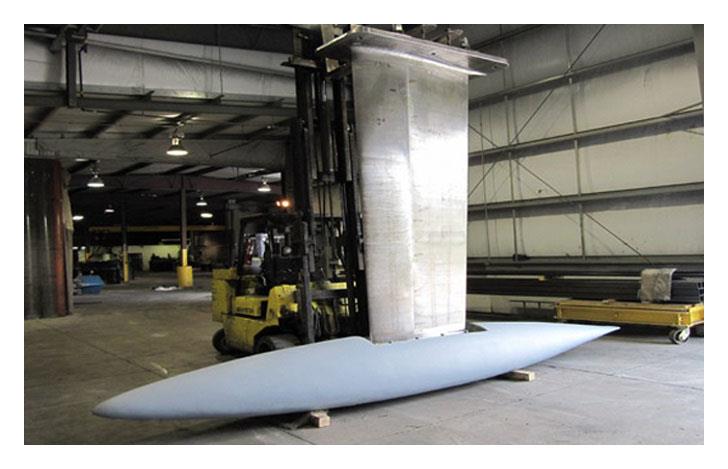
An interview with Bill Souter about the latest from MarsKeel
by David Schmidt 12 Jun 2024 03:00 NZST
June 11, 2024

MarsKeel 40 years of excellence © MarsKeel Technology
Spend some time thrashing around in washing-machine conditions or on a long ocean passage fraught with some weather, and odds are good that you will develop a true-love-but-not-seen relationship with your boat's keel. These silent members add stiffness and stability to keelboats and regularly do hero's work, but, unlike sails, running rigging, or spars, these appendages are often overlooked when it comes to parts of the yacht that are widely celebrated.
This, of course, is because they are part of the yacht's seldom-seen undercarriage. But remove their critical ballast from the equation, and things go pear-shaped, fast.
Keels can be separated into two general categories, namely production appendages and custom keels for one-off projects. MarsKeel, an Ontario, Canada-based keel manufacturer builds both.
I checked in with Bill Souter, who serve as MarsKeel's technical keel specialist, to learn more about MarsKeel's ballast-building operations and business.
Can you please start us off by telling us about where the name "MarsKeel" comes from?
MarsKeel is a branded name as part of Mars Metal Company. The other divisions of the company are, MarShield medical radiation protect products, and Mars Metal commercial castings.
In terms or rough percentages, how much of MarsKeel's business involves production keels?
The split is approx. 50-50 between production and custom.
What are the most popular production keels these days?
We are still producing a mixture of shoal draft and deep keels for our production builders.
What about custom keels? Roughly, what percentage of your business involves bespoke projects?
We do approximately 50 percent production and 50 percent custom keels of all sizes. They range from home builders to keels for super yacht.
Are most custom keels fixed or canting?
Virtually all of our custom keels are fixed or lifting keels. Canting keels are used on a tiny fraction of yachts and on the open-class racing yachts.
Are most custom keels built from lead, or do you get into any exotic materials or even exotic construction techniques, say carbon struts with leaded bulbs?
We build custom keels in a range of materials and combinations. [These include] all-lead castings, fabricated fins and lead bulbs. Hand faired or CNC machined to 0.004".
Our custom keels range in weight from 500 to 154,000 pounds.
We don't make carbon fins. They are used mostly in professional racing boats.
We use high-strength steel (A514, Weldox 700/900, 2205 Duplex SS, etc.) in the production of the fins. The designers use more exotic stronger materials to make more efficient fin.
Does anyone still use wings on their keels?
I'm sure there are builders using wing keels still. Our production customers are moving away from wings to bulbs. For example, we assisted Catalina Yachts in changing three of their models to bulb keels. I was told it improved the stability, lowered the [yacht's] center of gravity and improved boat speed.
In your mind, what's the cutting edge for custom keels these days?
I don't think there is a cutting edge for production builders. It is a balance between what engineering allows to be made and the needs of the yacht and the owner. The cutting edge will be in the high-performance custom keels.
Science [and] engineering are continuing to replace the "art" of many decades ago in the keel and yacht design process. This leads to faster and better products, keels, and yachts for both production and custom yachts.
As a follow-on to that last question, what's the cutting edge for production or One Design keels? Is this mostly really tight QA/QC work to ensure that batch productions are all identical on the granular/individual level?
In terms of one design keels some builders want the keels templated to ensure they are as close as possible without going to the huge expense of CNC machining. Other builders require the keels to be hand faired. It is really a matter of what is sufficient for a particular class.
In terms of production keels, we always take great care to make the keel as designed. You need to understand that most production builders want good keels but at a reasonable price.
In terms of one-off keels, it is not the amount of care taken, it is the scope of work [that's] very different from a production keel. The level of complication increases as you move away from simple all-lead castings, [and] more complex projects require more project management [that] involves looking for solutions to possible problems long before they arise, even as early as the pricing process.
You want avoid concerns through the use of consultation and experience.
Is there anything else about the keel business, or about what MarsKeel is working on, that you'd like to add, for the record?
We are currently working with customers from all over the world, dealing with home builders to production [boat]builders all the way to superyachts. This is our typical range of customers, wanting new keels, keel repairs (frost damage, keel bolt replacement) and draft reductions on existing keels.
Find out more at marskeel.com